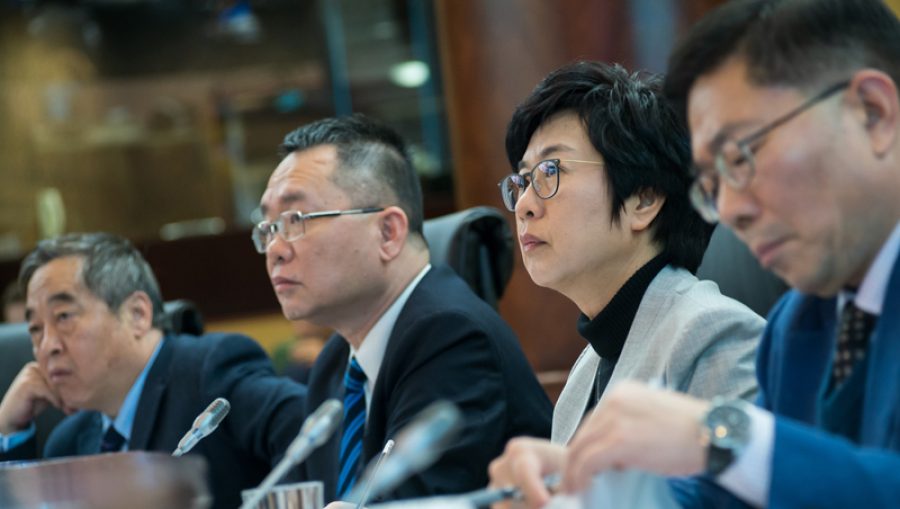The Legislative Assembly (AL) Thursday passed a government-initiated bill amending the existing local law on the use and protection of the national flag, national emblem and national anthem.
The amendment bill “localises” the country’s National Anthem Law to be applied in Macau, following its inclusion in Annex 3 of the Macau Basic Law as one of the national laws to be implemented in the special administrative region.
The bill’s outline was passed during a plenary session of the legislature in August last year. The legislature’s 1st Standing Committee held four meetings to review the bill.
Secretary for Administration and Justice Sonia Chan Hoi Fan, Legal Affairs Bureau (DSAJ) Director Liu Dexue and Government Information Bureau (GCS) Director Victor Chan Chi Ping attended the plenary session when the bill was voted on article-by-article in its final reading.
The amendment bill is commonly known as the local national anthem bill, as the bill primarily proposes amendments to rules concerning the national anthem listed in the existing local law on the use and protection of the national flag, national emblem and national anthem, and some additional new articles concerning the national anthem.
The bill will become law on the day following its promulgation in the Official Gazette (BO).
The country’s National Anthem Law was passed by the Standing Committee of the National People’s Congress (NPC) in Beijing on September 1, 2017 and took effect on October 1, 2017.
On November 4, 2017, the NPC Standing Committee adopted decisions to apply the National Anthem Law both in Hong Kong and Macau, the nation’s two special administrative regions.
According to the decisions, the National Anthem Law was to be included in Annex 3 of the Hong Kong Basic Law and Annex 3 of the Macau Basic Law. Both annexes list the national laws, resolutions and regulations to be applied in the two autonomous regions.
According to the basic laws of Hong Kong and Macau, national laws shall not be applied in the two regions, except for those listed in Annex 3 of their respective basic laws.
Afterwards, the local government started the legislative process to draft related local legislation for the National Anthem Law to be applied in Macau – by proposing amendments to local Law No. 5/1999 which regulates the use and protection of the national flag, national emblem and national anthem. This local piece of legislation came into force on the Establishment Day of the Macau Special Administrative Region (MSAR) on December 20, 1999.
Local Law No. 5/1999 states that the nation’s symbols – the national flag, national emblem and national anthem – are to be respected and protected.
According to Article 9 (1) of the existing version of local Law No. 5/1999, blatant insults or disrespect to a national symbol (the national flag, national emblem and national anthem) are punishable by a fine or up to three years’ imprisonment. According to Article 9 (2.2), the act of maliciously not following the score or modifying the lyrics when playing the national anthem constitutes disrespect to a national symbol.
Among the various amendments, the bill states that when the national anthem is performed and sung, those present shall stand and deport themselves respectfully, and must not disrespect the national anthem.
In the first draft of the bill, the government initially proposed that offenders in this situation would have faced a fine of between 2,000 patacas and 10,000 patacas.
When the bill was under review by the legislature’s 1st Standing Committee, the government submitted the revised version of the bill, which removed the initially-pro-posed fine for such a situation, considering the difficult implementation of this mle. For instance, physically disabled people may not be able to stand up when the national anthem is played.
The bill also proposed amendments to Article 9 of the existing local Law No. 5/1999. The final amendments state that the act of altering the lyrics or the score of the national anthem, or performing or singing the national anthem in a deliberately distorted or derogatory manner shall constitute a blatant insult to a national symbol.
According to the bill, the punishment imposed on those who violate Article 9 will remain unchanged – a fine or imprisonment of up to three years.
The bill includes several other new articles to be added to the existing version of local Law No. 5/1999, including one according to which the national anthem is to be included in secondary and primary education.
The final amendment states that secondary and primary schools shall teach their pupils to sing the national anthem, and educate them on the history and spiritual connotation of the national anthem and to obey the etiquette for performing and singing the national anthem.
The bill does not provide for any punishment concerning this rule.
The bill also states that the local government may request news media outlets to assist the government in launching its promotion campaigns for the national anthem. The bill does not provide for any penalties concerning this rule.
In the bill, the Chinese word used for “request” concerning the article is “yao qiu” in Putonghua. The Portuguese version of the bill uses the term “solicitar”. Some local journalists had expressed concern about the wording of the article.
During the plenary session, directly-elected non-establishment lawmakers Ng Kuok Cheong, Au Kam San and Sulu Sou Ka Hou voted against the article according to which the government can “request” the local media outlets to assist it in carrying out national anthem promotion campaigns.
During the plenary session, Sonia Chan reaffirmed that the national anthem bill will not affect Macau’s press freedom after it becomes law.
Sonia Chan said that the article was not about any compulsory requirement imposed on local media outlets and that the bill does not provide for any penalties concerning the rule. The police secretary insisted that the article will not have any adverse impact on Macau’s press freedom, and she urged the local media not to over-interpret the proposal.






